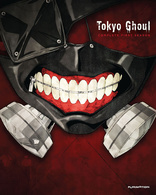Tokyo Ghoul: Season One Blu-ray Movie
HomeTokyo Ghoul: Season One Blu-ray Movie 
Limited Edition / Blu-ray + DVDFUNimation Entertainment | 2014 | 300 min | Rated TV-MA | Sep 22, 2015
Movie rating
6.7 | / 10 |
Blu-ray rating
| Users | 0.0 | |
| Reviewer | 3.5 | |
| Overall | 3.5 |
Overview
Tokyo Ghoul: Season One (2014)
In modern day Tokyo, society lives in fear of Ghouls: mysterious creatures that look exactly like humans, yet hunger insatiably for their flesh. None of this matters to Ken Kaneki, a bookish and ordinary young man, until a dark and violent encounter turns him into the first ever Ghoul-human half-breed. Trapped between two worlds, Ken must survive the violent conflicts of warring Ghoul factions while attempting to learn more about Ghoul society, his newfound powers, and the fine line between man and monster.
Starring: Natsuki Hanae, Sora Amamiya, Kana Hanazawa, Mamoru Miyano, Takayuki SugôDirector: Shuhei Morita
| Anime | Uncertain |
| Foreign | Uncertain |
| Comic book | Uncertain |
| Fantasy | Uncertain |
| Action | Uncertain |
| Horror | Uncertain |
Specifications
Video
Video codec: MPEG-4 AVC
Video resolution: 1080p
Aspect ratio: 1.78:1
Original aspect ratio: 1.78:1
Audio
English: Dolby TrueHD 5.1
Japanese: Dolby TrueHD 2.0
Subtitles
English
Discs
50GB Blu-ray Disc
Four-disc set (2 BDs, 2 DVDs)
DVD copy
Playback
Region A, B (locked)
Review
Rating summary
| Movie | 3.5 | |
| Video | 4.5 | |
| Audio | 4.0 | |
| Extras | 2.5 | |
| Overall | 3.5 |
Tokyo Ghoul: Season One Blu-ray Movie Review
Ghoul of his dreams.
Reviewed by Jeffrey Kauffman October 14, 2015Films like Warm Bodies and Life After Beth have posited something akin to “inter species” romances, offering humans at least attempting to have a so-called "love connection" with a zombie. Tokyo Ghoul, a fun if derivative anime from 2014 based on a manga by Sui Ishida, hints that it may be moving in somewhat the same direction, offering a young college student named Ken Kaneki who goes on a date with a beautiful if rather mysterious young woman named Rize Kamishiro, a girl who reveals herself to be, if not a zombie per se, something at least relatively close, called a “ghoul” in this story’s mythology. The “version” of Tokyo depicted in Tokyo Ghoul presents an environment which is perhaps not quite devolved to The Walking Dead status, but which still features the threat of ghouls feasting on human flesh if the humans aren’t careful about their comings and goings. Kaneki is oblivious to Rize’s alter ego, and in fact it’s not until she begins attacking him after their first date that he suddenly realizes that there is a manifest difference between their respective desires to “swap bodily fluids”. Just when it seems Rize has the upper hand (and/or teeth), fate intervenes, seeming to remove the incipient threat. However, that’s just the start of this story, for in a seemingly inexplicable twist of karma, Kaneki, who’s been badly injured in the fracas, becomes the recipient of some of Rize’s organs, leading to the central premise of the series, where Kaneki has to deal with being a kind of human-ghoul hybrid. Tokyo Ghoul traffics in some of the same content as any number of other anime which see heroes dealing with transitions in their states of being, but it’s unusually philosophical at times, addressing sometimes odd if admittedly provocative ideas about the nature of survival and even the role that food plays in that very quest to make it to the next day.
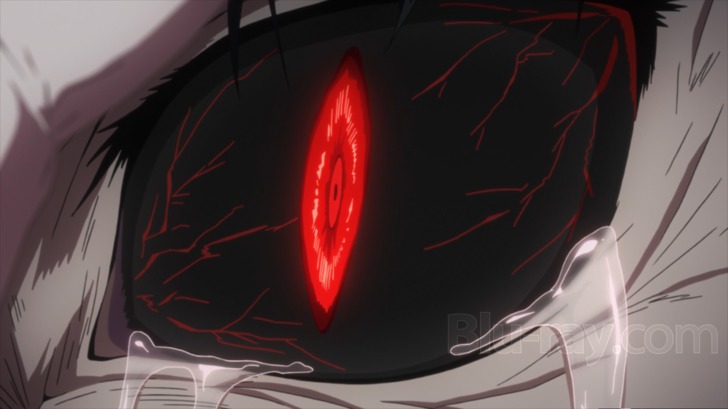
One of the kind of odd “givens” in zombie mythology is how the shuffling beasts need to feast on human flesh (and of course brains). Tokyo Ghoul doesn’t really provide an answer per se as to why this rather bizarre tendency should afflict various folks, but it makes the perhaps wry point that for ghouls, regular food tastes horrible, and in fact only flesh will satiate their hunger, which can grow to epic size if not satisfied appropriately. In fact, after his horrifying encounter with Rize and the subsequent transplants that keep him alive, one of the first clues Kaneki has that all is not well with his world is that “regular” food, including his favorite hamburger, tends to revolt him. In fact, when he tries to eat good old normal grub, he ends up worshiping at the porcelain throne, so to speak.
While it’s clear from some of the supporting characters that there will be a somewhat convoluted mythology to be explored down the line, the opening episodes of Tokyo Ghoul tend to emphasize Kaneki’s horror at figuring out that he’s become a half-ghoul. The anime is rather graphic in its depiction of ghouls feasting on flesh, something that makes Kaneki’s agony in (perhaps) having to engage in the same activity all the more riveting. In fact Tokyo Ghoul opens with an almost Grand Guignol inspired sequence that sees Rize, a so-called binge eater, chewing her way through an assortment of body parts. Later, after Kaneki’s transformation, he finds some solace at a local coffee house called Anteiku, which (predictably) turns out to be a refuge for ghouls, including waitress Touka Kirishima and proprietor Yoshimura, a courtly older gentleman who takes Kaneki under his wing and (in one of the anime’s slyer offerings) reveals that coffee itself is the one normal human food (and/or drink) that ghouls can still stomach.
Kaneki’s angst at his “half breed” status continues to inform the series, and in fact if one considers a very late development that occurs toward the end of the first season, this plot element could be seen as the central defining element of Tokyo Ghoul. It’s certainly one of the more successful, for the series is perhaps less effective in doling out various warring groups that pit ghouls against humans and in fact against each other. There’s a somewhat redacted feel to much of the storytelling here, as if large swaths of Sui Ishida’s original formulation had been left on the cutting room floor or at least considered too tangential for full treatment.
What works best throughout the first season in Tokyo Ghoul is the surprisingly moving disconnect between where various characters are and where they desire to be. While Kaneki’s tale is front and center, a number of supporting characters are stuck on the horns of various dilemmas, and their stories, while not providing as much dramatic impetus to the overall storyline, do offer some touching moments. The action elements often seem shoehorned into the proceedings, but provide a bit of interstitial bombast to break up what is otherwise a rather thoughtful, almost philosophically minded, entry.
Tokyo Ghoul: Season One Blu-ray Movie, Video Quality 
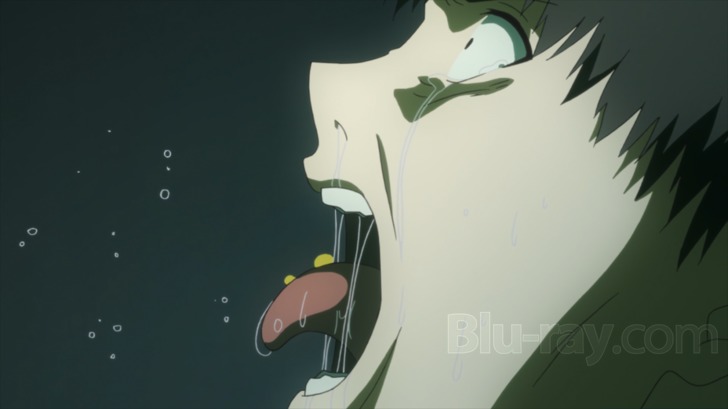
Tokyo Ghoul is presented on Blu-ray courtesy of FUNimation Entertainment with an AVC encoded 1080p transfer in 1.78:1. There are some cool quasi-graphical elements at play throughout this anime, some from virtually the get go, that give Tokyo Ghoul a very distinctive aesthetic edge. More or less "traditional" depictions of what's going on will suddenly transform into near abstract visions, with various pulsating patterns and a wash of color that makes events look almost like living designs at times. The palette throughout the series is quite vivid, and is reproduced here excellently, with little to no banding problems. What's kind of interesting about the overall design aesthetic of the show is that the actual characters are drawn in an almost "old school" style, one that harkens back to other anime "half breeds" like Yu Yu Hakusho. Line detail is strong and precise, posing no resolution issues throughout the series.
Tokyo Ghoul: Season One Blu-ray Movie, Audio Quality 
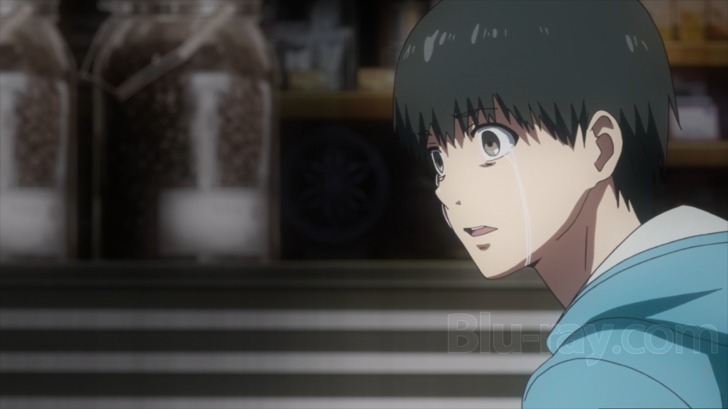
Tokyo Ghoul offers the original Japanese language track via Dolby TrueHD 2.0 and an English dub in Dolby TrueHD 5.1. The 5.1 track is significantly more forceful from the midrange down, though that said, this series doesn't really traffic in a "balls to the wall" sound design a lot of the time, despite the typical fight and/or ghoul feasting scene that will erupt in any given episode. Instead, immersion is obtained more naturally courtesy of more nuanced ambient environmental effects, like the clank of glasses in the coffee house. Dialogue is presented cleanly and clearly on this problem free track.
Tokyo Ghoul: Season One Blu-ray Movie, Special Features and Extras 
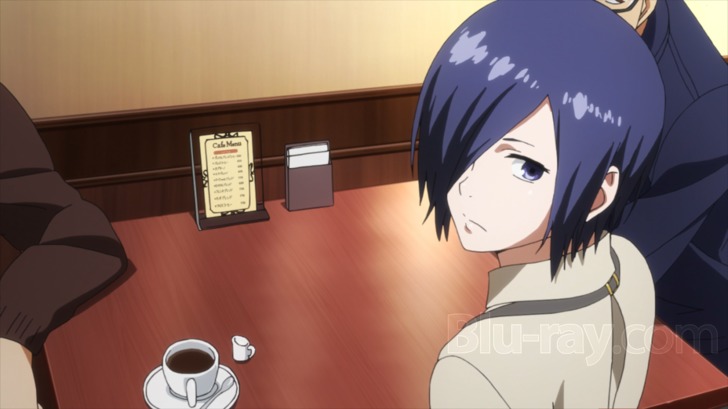
Disc One:
- Episode 4 Commentary features Mike McFarland, Austin Tindle, J. Michael Tatum and Brina Palencia.
- Kaneki in Black and White (1080p; 27:42) is a decent overview of the series (including a few potential spoilers) with lots of interviews with various FUNimation folks.
- Episode 12 Commentary features Mike McFarland, Monica Rial, Christopher Sabat, and Austin Tindle.
- Japanese Commercials (1080p; 2:12)
- Promotional Videos (1080p; 2:34)
- Preview Collection (1080p; 6:22)
- U.S. Trailer (1080p; 2:02)
- Textless Opening Song "Unravel" (1080p; 1:32)
- Textless Closing Songs:
- "The Saints / Seijatachi" Version 1 (1080p; 1:32)
- "The Saints / Seijatachi" Version 2 (1080p; 1:32)
- "The Saints / Seijatachi" Version 3 (1080p; 1:32)
- "The Saints / Seijatachi" Version 4 (1080p; 1:32)
Tokyo Ghoul: Season One Blu-ray Movie, Overall Score and Recommendation 
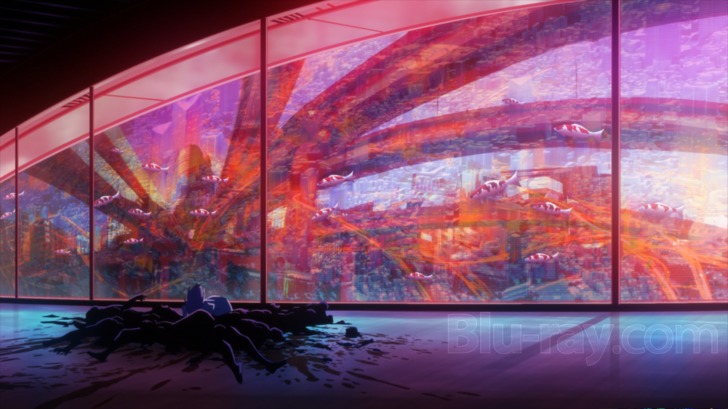
Tokyo Ghoul seems a bit rushed at times, as if it needs to feast on the next story point kind of like a hungry ghoul needs to quickly find some human flesh to munch on. That proclivity aside, the anime offers really strong and interesting characters and sets up some really intriguing moral paradoxes that it explores in an unusually philosophical way. Technical merits are generally very strong, and Tokyo Ghoul comes Recommended.
Other editions
Tokyo Ghoul: Other Seasons

Tokyo Ghoul: Season 1
2014

Tokyo Ghoul: Season 1
Collector's Edition
2014

Tokyo Ghoul: Season 1
Collector's Edition | 東京喰種 -トーキョーグール- / Tōkyō Gūru
2014

Tokyo Ghoul: Complete First Season
Classics
2014
Similar titles
Similar titles you might also like
(Still not reliable for this title)

Tokyo Ghoul - Complete Second Season
Classics
2015

Tokyo Ghoul:re - Part 2
Limited Edition
2018

Sword Art Online II Box Set
2014

Parasyte: The Maxim - Complete Collection
2014-2015

Attack on Titan: Final Season
2020-2023

Akame ga KILL!: Complete Collection
アカメが斬る! / Akame ga Kiru!
2014

Noragami: The Complete First Season
Limited Edition | Stray God | ノラガミ
2014

Sword Art Online
Extra Edition | Standard Edition
2013

My Hero Academia: Season Seven, Part One
僕のヒーローアカデミア / Boku no Hero Academia
2023-2024

Beyond the Boundary: Complete Collection
境界の彼方 / Kyoukai no Kanata
2013

Fullmetal Alchemist: The Complete Series
2003-2004

The Devil Is a Part-Timer!: Season 2 Part 2
はたらく魔王さま! / Hataraku Maou-sama!
2023

Code Geass Lelouch of the Rebellion: Complete Series
コードギアス 反逆のルルーシュ / コードギアス 反逆のルルーシュR2
2006-2008

No Game, No Life: Complete Collection
ノーゲーム・ノーライフ / Nōgēmu Nōraifu
2014

Demon Slayer: Kimetsu no Yaiba Part 1
2019

Overlord: Season 1
2015

The Future Diary: The Complete Series + OVA
Classics
2011-2012

High School of the Dead: Complete Collection
2010-2011

Black Lagoon: Roberta's Blood Trail
2010-2011

Sword Art Online the Movie: Ordinal Scale
劇場版 ソードアート・オンライン -オーディナル・スケール-
2017
